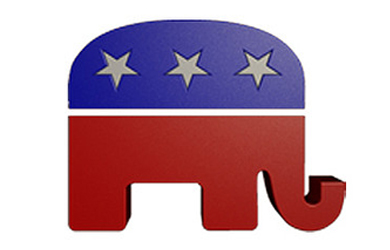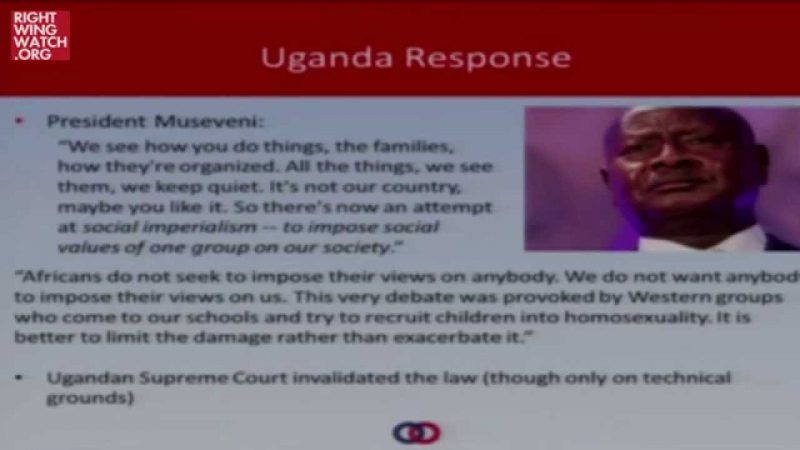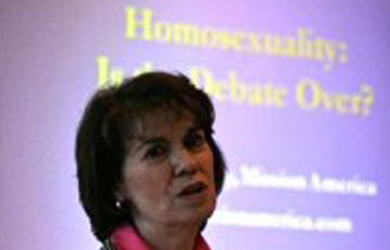Writing for the American Spectator, Jeff Walton of the Institute on Religion and Democracy condemned the State Department for advancing the rights of gays and lesbians abroad. The IRD is a far-right group with a two-pronged strategy to advance its opposition to gay rights: dividing and decrying churches, particularly Mainline Protestant denominations, which favor LGBT equality, while at the same time aiding and promoting groups in Africa and the U.S. that attack gays and even support the criminalization of homosexuality. Most recently, the IRD vilified a North Carolina church group for electing an openly gay layman as the President. In addition to the group’s militant stance on gay rights, the IRD also works against the rights of women and immigrants, and criticizes the environmental movement, and the IRD has ties to major right wing organizations like the Heritage Foundation, Concerned Women For America, Numbers USA, and the American Enterprise Institute.
Walton, the Communications Manager for the IRD who previously alleged that the Episcopal Church could be held responsible for the deaths of Christians abroad because it allows gays and lesbians to serve as Bishops, now is taking to the ultraconservative Spectator to reproach the State Department for “promoting homosexuality overseas.” He blasts Secretary Hillary Clinton for allegedly wanting to “legitimize homosexual practices in those socially traditional countries,” like those in Africa, and maintains that efforts to protect gays from discrimination are affronts to “religious freedom.” Walton denounces the State Department’s work to document anti-gay laws and violence, and the pressure it puts on countries like Uganda to improve the rights of gays:
Although the language of some U.S. officials begins with the legitimate concern for personal safety and freedom from the threat of violence, it often ends by demanding acceptance of homosexual acts as a human right.
“We’ve come such a far distance in our own country, but there are still so many who need the outreach, need the mentoring, need the support, to stand up and be who they are, and then think about people in so many countries where it just seems impossible,” Secretary of State Hillary Clinton said during a speech in June as part of “Pride Month” celebrations at the U.S. State Department.
At the event, which was organized by the group “Gays and Lesbians in Foreign Affairs Agencies,” Clinton said the State Department is supporting efforts to advance homosexual rights around the world. “We celebrate the progress of advancing the rights of LGBT [Lesbian, Gay, Bisexual and Transgender] in our country, as we continue to advance the rights of all people around the world,” Clinton gushed before the receptive audience, adding that the “struggle for equality is never, ever finished.”
…
During her June address, Clinton stated that her department has formalized reporting on homosexual rights for the first time in the 2009 annual human rights report that was issued in February on every country in the world. But the top U.S. diplomat quickly honed in on Africa, saying that U.S. embassies there had been directed to ask their host government about the status of LGBT rights. A special panel discussion on LGBT rights in Africa was also held later in the day.
He goes on to rebuke Assistant Secretary of State Michael H. Posner, openly gay Episcopal Bishop Gene Robinson, and Bishop Christopher Senyonjo, an Anglican Bishop who worked in Ugana to improve the livelihoods of marginalized gay Ugandans and diligently opposed a bill in Uganda’s Parliament that “would make homosexuality illegal, in some cases punishable by death.” Walton says:
In March, Posner introduced the State Department human rights report to Congress, emphasizing what was termed a growing crisis in abuse directed against LGBT people worldwide, and urging the use of diplomacy to counter the alleged trend.
In introducing the report, Posner singled out the case of Uganda, where he alleged that introduction of anti-homosexuality legislation has resulted in abuse. The report further documents LGBT-related incidents in almost every country in the world.
Posner’s report met agreement with Robinson and Senyonjo during their conversation at CAP.
“[The] time is coming when we should not work on just one bill, but towards decriminalization,” Senyonjo said, adding that he was “very grateful for voices all over the world that work against oppression.”
“It is wrong to say, ‘Don’t interfere, it’s a domestic thing,'” the former Anglican bishop said. He compared foreigners working for decriminalization of homosexuality in Africa to aid workers providing earthquake relief in Haiti.
…
In that commissioning, Senyonjo seems to have found a partner in the U.S. State Department. For them, seemingly sexual freedom is more important than religious freedom. Look for more developments in 2011.
Walton never explains how defending gays from violence and discrimination undermines “religious freedom,” and dismisses Bishop Senyonjo’s religiously-grounded defense of LGBT equality. Just as the IRD demonized many US churches who worked in social justice and anti-apartheid activism in South Africa because they also supported rights for gays and lesbians, Walton and the IRD are criticizing the State Department for working to document and prevent the persecution and oppression of gays outside of the U.S.








